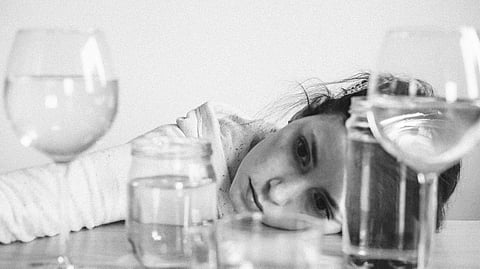Alcohol Withdrawal Therapy Linked to Healthy Changes in the Gut Microbiome, Raising the Possibility of New Targets for Treating Alcohol Use Disorder
Alcohol withdrawal is associated with positive changes in the composition and function of the gut microbiome, improving our understanding of the gut’s influence on physiological and behavioral health, including alcohol craving, a new study suggests. Current research may lead to new targets and probiotic treatments for Alcohol Use Disorder (AUD).
Dangerous drinking patterns are associated with negative changes in the gut microbiome, which are implicated in brain inflammation and unhealthy behaviors (such as impaired sociability in people with AUD, and depression and anxiety). Previous investigations suggest certain gut bacteria indirectly influence alcohol craving. For the study in Alcohol: Clinical & Experimental Research, scientists in Germany focused on butyrate, an anti-inflammatory molecule and one of the short-chain fatty acids involved in regulating appetite and possibly alcohol craving.
Researchers worked with 63 people with AUD undergoing withdrawal therapy over 10-14 days, analyzing their blood and stool. They used metagenomic (“shotgun sequencing”) and statistical analysis to explore associations between changes to the microbiome and alcohol craving.
During alcohol withdrawal therapy, participants’ bacterial load increased, their gut microbiota composition became more like that of healthy people, and their alcohol cravings diminished. Researchers observed increases in certain bacteria that have anti-inflammatory properties, support butyrate production, and appear linked to psychological health.
Changes in the abundance of several bacteria correlated with shifting levels of interleukins (ILs, proteins involved in the immune response, such as inflammation). The participants’ improved potential to synthesize butyrate likely led to higher butyrate levels, with the potential for more effective appetite regulation.
In addition, declining levels of IL-8 point to its role in brain inflammation associated with alcohol craving and drinking. Decreasing levels of a particular bacterium suggest that it is linked to alcohol use.The study helps illuminate connections between the gut and the brain that influence physical and mental health.
The findings add to evidence that butyrate affects alcohol craving, possibly via its role in regulating appetite, and may be a potential therapeutic target. They highlight the association between certain interleukins, specific microbiome composition, and some disease outcomes, with inflammation potentially mediating the link between the gut microbiome and alcohol craving.
The effect of alcohol withdrawal therapy on gut microbiota in alcohol use disorder and its link to inflammation and craving.
(Newswise/SG)


